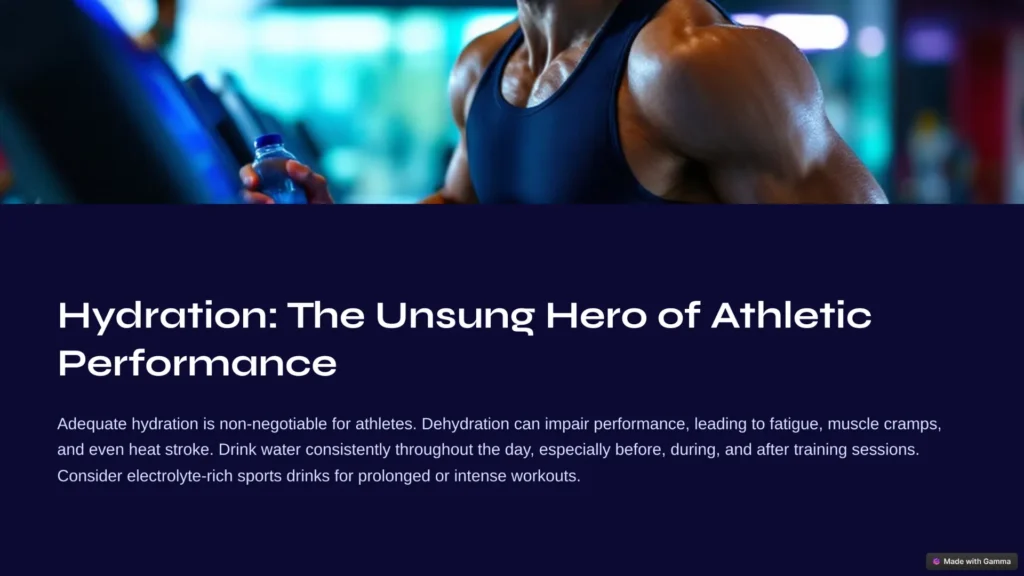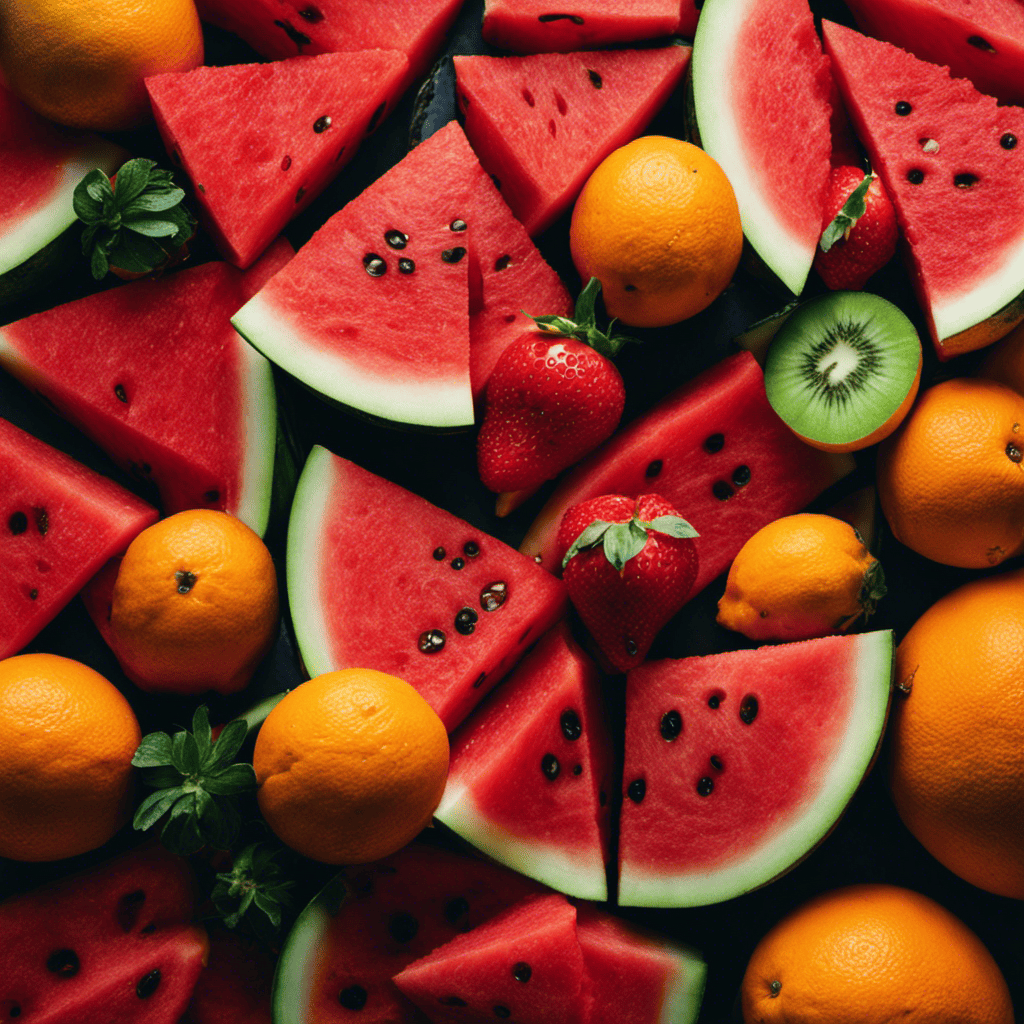Are you ready to step up your hydration game and dominate in all areas of your life? Look no further. In this article, we’ve got the tips you need to stay ahead of the game when it comes to staying hydrated. From understanding your body’s needs to avoiding common mistakes, we’ll show you how to make hydration a habit that fits into even the busiest of schedules. So grab a glass of water and get ready to conquer the world with these practical hydration tips.
Key Takeaways

- Hydration is crucial for physical and cognitive performance.
- Proper hydration helps maintain muscle strength and endurance for weightlifters.
- Electrolytes play a crucial role in maintaining proper hydration levels.
- Replenishing electrolytes is important to avoid imbalances.
The Importance of Hydration for Optimal Performance
You need to prioritize staying hydrated if you want to perform at your best. Hydration is not just important for physical performance but also for cognitive function. When you are dehydrated, even mildly so, your brain functions can be affected. Research has shown that dehydration can negatively impact memory, attention, and overall cognitive performance.
For weightlifters, proper hydration is crucial as it helps maintain muscle strength and endurance. When you lift weights, your muscles generate heat and water loss occurs through sweating. If you don’t replace the lost fluids, it can lead to decreased performance and increased fatigue.
To ensure optimal hydration during weightlifting sessions, here are some practical tips:
- Drink water before, during, and after your workouts.
- Pay attention to urine color – pale yellow or clear indicates adequate hydration.
- Consider sports drinks with electrolytes for longer workouts or intense training sessions.
- Listen to your body’s thirst cues and drink accordingly.
Understanding your body’s hydration needs goes beyond just drinking enough water; it involves finding the right balance between fluid intake and output based on factors like sweat rate and exercise intensity.
Understanding Your Body’s Hydration Needs

Understanding your body’s hydration needs can help improve your overall health and performance. Hydration science is a fascinating field that explores how our bodies maintain fluid balance and the importance of electrolytes in this process. Electrolytes are minerals like sodium, potassium, and magnesium that play a crucial role in maintaining proper hydration levels.
When you exercise or engage in any physical activity, your body loses water through sweat. This loss of fluids can lead to dehydration if not replenished adequately. By understanding your body’s hydration needs, you can ensure that you stay properly hydrated throughout the day.
One key aspect to consider is the importance of electrolytes. These minerals are essential for maintaining proper fluid balance in your cells and regulating muscle contractions. When you sweat, you lose not only water but also electrolytes. Replenishing them is crucial to avoid imbalances that can negatively impact your health and performance.
By incorporating electrolyte-rich foods and beverages into your diet, such as fruits, vegetables, sports drinks, or coconut water, you can provide your body with the necessary nutrients it needs for optimal hydration.
As we delve deeper into understanding your body’s hydration needs, it is important to be aware of the signs of dehydration to watch out for…
Signs of Dehydration to Watch Out For
As you delve deeper into this topic, it is crucial to be aware of the signs of dehydration that you should watch out for. Dehydration occurs when your body loses more fluids than it takes in, and it can have serious consequences on your overall health and performance. By recognizing the symptoms early on, you can take immediate action to prevent further dehydration.
Here are some common signs of dehydration that you should be mindful of:
| Symptoms | Description |
|---|---|
| Dry mouth | Feeling thirsty and having a parched or sticky sensation |
| Fatigue | Feeling tired and lacking energy |
| Dizziness | Experiencing lightheadedness or feeling faint |
| Dark urine | Urine appearing darker than usual |
If you notice any of these symptoms, it’s important to rehydrate immediately. Remember, prevention is key when it comes to dehydration. Make sure to drink plenty of fluids throughout the day, especially during physical activity or hot weather. Aim for at least 8 cups (64 ounces) of water per day, but adjust based on your individual needs.
Now that you understand the signs of dehydration and how crucial prevention is, let’s explore hydration strategies for endurance athletes without missing a beat.
Hydration Strategies for Endurance Athletes

Before you hit the gym or lace up your running shoes, it’s important to properly hydrate yourself. Pre-workout hydration techniques can help optimize your performance and prevent dehydration during exercise. During your workout, replenishing electrolytes is crucial for maintaining proper fluid balance and preventing muscle cramps. And after you’ve finished sweating it out, post-workout hydration recovery is essential for restoring lost fluids and aiding in muscle recovery.
Pre-Workout Hydration Techniques
To maximize your performance during a workout, it’s important to hydrate properly beforehand. Here are some effective hydration techniques and pre-exercise hydration strategies that can help you stay ahead of the game:
- Drink plenty of water: Start hydrating at least 2 hours before your workout by drinking 16-20 ounces of water.
- Consume electrolytes: Include sports drinks or coconut water in your pre-workout routine to replenish electrolytes lost through sweat.
These techniques will ensure that you’re adequately hydrated before hitting the gym or going for a run. Remember, staying hydrated is crucial for maintaining optimal performance and preventing dehydration-related fatigue and muscle cramps.
As you transition into the next section about electrolyte replenishment during exercise, keep in mind that proper hydration goes hand in hand with electrolyte balance for peak performance.
Electrolyte Replenishment During Exercise
During exercise, it’s important to replenish electrolytes lost through sweat in order to maintain optimal performance. Electrolyte balance is crucial for proper hydration and muscle function. When you sweat, your body loses not only water but also important minerals like sodium, potassium, and magnesium. These electrolytes play a vital role in regulating fluid balance, nerve function, and muscle contractions.
Maintaining electrolyte balance is essential to prevent dehydration and muscle cramps during workouts. Dehydration can lead to decreased performance, fatigue, and even heatstroke. Muscle cramps occur when there is an imbalance of electrolytes in the body.
To ensure you stay hydrated and maintain electrolyte balance during exercise, consider hydrating with sports drinks that contain these essential minerals. Look for drinks that are low in sugar but high in electrolytes.
Transitioning into the subsequent section about ‘post-workout hydration recovery,’ it’s important to continue replenishing fluids and electrolytes after your workout to aid in recovery and prepare for future sessions without compromising your performance.
Post-Workout Hydration Recovery
After your workout, make sure you focus on replenishing fluids and electrolytes to aid in recovery and prevent any negative effects on your performance. Rehydration techniques are crucial to restoring the body’s hydration levels and optimizing recovery. To help you understand the importance of post-workout hydration, here is a table that highlights some common rehydration techniques:
| Rehydration Techniques | Benefits |
|---|---|
| Drinking water | Restores fluid balance and prevents dehydration |
| Consuming electrolyte-rich beverages | Replenishes essential minerals lost through sweat |
| Eating water-rich fruits and vegetables | Provides additional hydration along with vitamins and minerals |
| Using sports drinks | Helps replace both fluids and electrolytes |
Hydrating Before, During, and After Exercise
When it comes to optimizing your performance and recovery during exercise, proper hydration is key. Pre-workout hydration tips can help ensure that you start your workout in a hydrated state, which can improve your endurance and prevent fatigue. Staying hydrated during exercise is equally important as it helps regulate your body temperature, maintain blood volume, and transport nutrients to your muscles. And don’t forget about the post-workout hydration benefits – replenishing fluids lost through sweat can help with muscle recovery and reduce the risk of dehydration-related symptoms like headaches and dizziness.
Pre-Workout Hydration Tips
To maximize your performance, it’s important to hydrate properly before your workout. Pre-workout hydration provides numerous benefits, including improved endurance, reduced muscle cramps, and enhanced cognitive function. Here are three hydration tips to help you stay ahead of the game:
- Start early: Begin hydrating at least two hours before your workout by drinking water or sports drinks.
- Monitor urine color: Aim for a pale yellow color to ensure adequate hydration.
- Consume electrolytes: Include foods and drinks rich in electrolytes such as bananas or coconut water to maintain proper balance.
Proper pre-workout hydration sets you up for success by ensuring that your body is ready for the physical demands ahead. Now let’s transition into discussing the importance of hydration during exercise…
Hydration During Exercise
During exercise, it’s crucial to stay properly hydrated in order to maintain peak performance and prevent dehydration. Preventing dehydration is key for optimal physical performance and overall well-being. When you sweat during a workout, your body loses water and electrolytes, which can lead to fatigue, muscle cramps, and decreased endurance. By staying hydrated, you can improve your athletic performance and avoid these negative effects.
Moreover, hydration plays a significant role in weight loss. Drinking enough water before and during exercise can help control your appetite and support proper digestion. It also aids in the breakdown of fat cells and promotes the elimination of waste products from the body.
Post-Workout Hydration Benefits
Now that you understand the importance of staying hydrated during exercise, let’s talk about the benefits of post-workout hydration. After a tough workout, your body needs replenishment to aid in muscle repair and recovery. Hydrating after exercise helps replace lost fluids and electrolytes, allowing your muscles to recover more efficiently. Proper post-workout hydration also plays a crucial role in reducing muscle soreness and preventing dehydration-related symptoms like fatigue and dizziness.
By consuming fluids rich in essential nutrients post-workout, you can expedite the recovery process and optimize your performance for future workouts. But what are the best hydration drinks for athletes? Let’s dive into that next section to explore some great options without skipping a beat.
Transition: Now that we’ve covered the benefits of post-workout hydration, it’s time to discover which drinks are ideal for keeping athletes properly hydrated.
The Best Hydration Drinks for Athletes

Quench your thirst and fuel your performance with the best hydration drinks for athletes. Staying hydrated is essential for sports performance, and choosing the right beverages can make all the difference. Here are some top hydration drinks that will keep you at the top of your game:
- Sports Drinks: These beverages are specifically designed to replenish electrolytes lost during intense exercise. They provide a good balance of carbohydrates and minerals, helping to prevent dehydration and muscle cramps.
- Coconut Water: Packed with natural electrolytes such as potassium and magnesium, coconut water is a refreshing option that can help maintain proper hydration levels.
When it comes to staying hydrated, finding what works best for you is crucial. Experiment with different options until you find one that not only quenches your thirst but also enhances your performance.
Now that you know about the best hydration drinks for athletes, let’s move on to tips for staying hydrated in hot weather without compromising your freedom to enjoy outdoor activities.
Tips for Staying Hydrated in Hot Weather
To keep yourself properly hydrated in hot weather, it’s important to drink plenty of fluids throughout the day. This applies not only when you’re outdoors, but also when you’re at work. The scorching heat can quickly deplete your body of water and electrolytes, leading to dehydration and a decrease in productivity. To combat this, make sure you always have a water bottle by your side and sip on it regularly. But plain water might not be enough – especially if you’re sweating heavily due to physical exertion or high temperatures.
Electrolytes play a crucial role in hydration as they help maintain the balance of fluids in your body. They include minerals like sodium, potassium, calcium, and magnesium. Consider incorporating electrolyte-rich drinks into your routine to replenish what is lost through sweat. Sports drinks or coconut water are good options that provide both hydration and essential electrolytes.
As you head back to work after a break, remember that staying hydrated doesn’t stop there. Keep a reusable water bottle on your desk or nearby so you can easily take sips throughout the day. Aim for at least eight cups (64 ounces) of fluids daily – more if you’re physically active or exposed to extreme heat.
Transition: Now that we’ve covered the importance of staying hydrated at work and the role of electrolytes in hydration…
Hydration Mistakes to Avoid
Don’t forget, one common mistake is relying solely on thirst to determine when you need to drink more fluids. Many people believe that if they feel thirsty, it means their body is already dehydrated. However, this is a hydration myth. Thirst is actually a sign that your body is already starting to become dehydrated. By the time you feel thirsty, you may already be losing up to 2% of your body’s water content.
Another common hydration mistake is thinking that drinking any fluid will do the trick. While all fluids can contribute to your overall hydration status, some are better than others. Sugary drinks and caffeinated beverages can actually have a diuretic effect, causing you to lose more fluids through urine. Water and sports drinks are generally the best options for staying hydrated throughout the day.
To make hydration a habit, it’s important to be mindful of your fluid intake throughout the day. Set reminders or keep a water bottle nearby as visual cues to remind yourself to drink regularly. Additionally, incorporating hydrating foods such as fruits and vegetables into your diet can also help maintain proper hydration levels.
How to Make Hydration a Habit
Are you struggling to make hydration a habit? Consistent water intake is key to staying properly hydrated, as it helps replenish the fluids your body needs on a daily basis. Hydration reminders and cues can be helpful tools in reminding you to drink enough water throughout the day, such as setting alarms or using apps that track your water intake. Incorporating hydrating habits into your routine, like drinking a glass of water before each meal or carrying a reusable water bottle with you at all times, can also make it easier to stay hydrated consistently.
Consistent Water Intake
Make sure you’re consistently drinking enough water to stay properly hydrated. Consistent water tracking is essential for maintaining optimal hydration levels throughout the day. Tracking your water intake can help you stay accountable and ensure that you are meeting your daily hydration needs.
Here are some benefits of staying hydrated:
| Benefit | Description | Why it’s important |
|---|---|---|
| Increased energy levels | Proper hydration helps improve energy levels and combat fatigue. | Staying hydrated allows your body to function at its best, keeping you energized throughout the day. |
| Improved physical performance | Hydration plays a crucial role in athletic performance and endurance. | By staying properly hydrated, you can enhance your physical performance and maximize your workouts. |
| Enhanced cognitive function | Adequate hydration supports brain function, including better concentration and mental clarity. | Being well-hydrated promotes optimal cognitive abilities, helping you think more clearly and stay focused. |
Hydration Reminders and Cues
One effective way to remind yourself to drink enough water is by setting reminders on your phone throughout the day. Hydration reminders can be a helpful tool in ensuring that you meet your daily water intake. Research suggests that staying adequately hydrated has numerous health benefits, such as improving cognitive function, boosting energy levels, and supporting overall well-being. By incorporating hydration reminders into your daily routine, you can create a habit of regularly drinking water. Set alarms or notifications on your phone at specific intervals throughout the day, prompting you to take a sip of water. This simple action can help you stay mindful of your hydration needs and make it easier to reach your daily water intake goals.
Incorporating Hydrating Habits
Now that you’re aware of the importance of hydration and have some cues to remind you, it’s time to incorporate hydrating habits into your daily routine. One effective way to stay hydrated is by establishing hydration routines. This means setting specific times throughout the day to drink water. For example, you could start your morning with a glass of water before breakfast, have a bottle of water on your desk at work, and make it a habit to drink a glass of water before each meal. By incorporating these routines into your day, you’ll be more likely to stay hydrated consistently.
Speaking of staying hydrated at work, it can be challenging when you’re busy or caught up in tasks. However, there are simple strategies that can help ensure you stay hydrated throughout the day. Keep an eye out for the upcoming section on "hydration tips for busy professionals."
Hydration Tips for Busy Professionals
Don’t forget to prioritize staying hydrated as a busy professional. It’s easy to get caught up in the demands of your desk job or long meetings, but maintaining proper hydration is crucial for optimal performance and overall well-being. Here are some practical tips to help you stay hydrated throughout your busy workday.
Firstly, keep a water bottle at your desk and make it a habit to sip from it regularly. Having water readily available will serve as a reminder to hydrate yourself frequently. Additionally, try setting reminders on your phone or computer to take regular water breaks.
During long meetings, it can be challenging to find the time for hydration. However, staying hydrated is essential for maintaining focus and preventing fatigue. Take advantage of any breaks during the meeting to drink some water or bring a bottle with you into the conference room.
Furthermore, consider incorporating hydrating foods into your meals and snacks. Fruits like watermelon, cucumber, and oranges have high water content and can contribute towards your daily hydration needs.
Remember that dehydration can affect your cognitive function and productivity levels. By following these simple hydration tips for desk jobs and long meetings, you’ll ensure that you stay ahead of the game as a busy professional while keeping yourself energized and focused throughout the day.
Frequently Asked Questions
Can Dehydration Affect Cognitive Function and Mental Performance?
Dehydration can negatively impact your cognitive function and mental performance. It can affect memory retention, making it harder to remember information. It can also impair problem-solving abilities, hindering your ability to think critically and make decisions. Stay hydrated for optimal brain function.
Is It Possible to Overhydrate?
You can have too much of a good thing. Overhydrating is possible and comes with its own risks. Look out for signs like frequent urination and nausea to avoid going overboard.
How Does Hydration Impact Muscle Recovery After Exercise?
Hydration plays a crucial role in muscle recovery after exercise. It helps promote muscle growth and reduces post-workout soreness. Staying hydrated allows your muscles to repair and rebuild more efficiently, leading to faster recovery and better performance.
Are There Any Specific Hydration Guidelines for Older Adults?
When it comes to hydration guidelines for older adults, it’s important to stay on top of your water intake. Make sure to drink enough fluids throughout the day and listen to your body’s signals for thirst.
What Are Some Alternative Sources of Hydration Besides Water?
Looking to stay hydrated? Consider electrolyte beverages and fruit infused water as alternative sources of hydration. They can provide essential nutrients and flavor, keeping you refreshed and energized throughout the day.
Conclusion
In conclusion, staying hydrated is crucial for optimal performance and overall well-being. By understanding your body’s hydration needs and recognizing signs of dehydration, you can take proactive steps to ensure you stay properly hydrated. Whether you’re an endurance athlete or a busy professional, it’s important to hydrate before, during, and after exercise or in hot weather. Remember, "prevention is better than cure," so make hydration a habit and avoid common mistakes that may hinder your performance. Stay ahead of the game by prioritizing your hydration!
As a veteran fitness technology innovator and the founder of GearUpToFit.com, Alex Papaioannou stands at the intersection of health science and artificial intelligence. With over a decade of specialized experience in digital wellness solutions, he’s transforming how people approach their fitness journey through data-driven methodologies.
